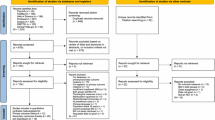Abstract
Objective:
To explore motivation and perceived barriers towards weight loss among Danish men.
Design:
The study was of an explorative nature, using qualitative focus group interviews as a method.
Setting:
Copenhagen, Denmark.
Subjects:
Twenty-two overweight men, at the age of 25–44 years and motivated for weight loss, were recruited and distributed into four focus groups. The men were primarily unskilled workers. Overall 13 men participated and each group contained three or four participants.
Intervention:
The interview guide was partly structured, partly unstructured and the themes of the interviews were motives and perceived barriers towards weight loss.
Results:
Main barriers for losing weight appeared to be lack of motivation and the perception of the slimming diet. The men had a desire to have a lean appearance and avoid illness, but in all the interviews it appeared that the strongest motive for losing weight was a strong desire to become more effective and a greater asset for one's workplace. Overweight subjects were considered less effective and attractive for the labour market.
Conclusion:
This study indicates that if men from lower socioeconomic backgrounds are to be motivated to weight loss the focus should not be on leanness and good health but rather on increased effectiveness and performance, and the arena should include the working place.
Sponsorship:
The Royal Veterinary and Agricultural University supplied the necessary equipment and conference rooms.
This is a preview of subscription content, access via your institution
Access options
Subscribe to this journal
Receive 12 print issues and online access
$259.00 per year
only $21.58 per issue
Buy this article
- Purchase on Springer Link
- Instant access to full article PDF
Prices may be subject to local taxes which are calculated during checkout
Similar content being viewed by others
References
Andersson S (1980). Matens Roller – Sociologisk Gastronomi. (The roles of food – Sociological gastronomy) Almqvist & Wicksell Förlag AB: Stockholm.
Bendixen H, Madsen J, Bay-Hansen D, Boesen U, Ovesen LF, Bartels EM et al. (2002). An observational study of slimming behavior in Denmark in 1992 and 1998. Obes Res 10, 911–922.
Bendixen H, Holst C, Sørensen TIA, Raben A, Bartels EM, Astrup A (2004). Major increase in prevalence of overweight and obesity between 1987 and 2001 among Danish adults. Obes Res 12, 1464–1472.
Bojlén NS, Lunde IM (1995). Fokusgruppeinterview som kvalitativ forskningsmetode. [Focus group interviews as a qualitative research method]. Ugeskr Læger 157, 3315–3318.
Cameron E, Bernardes J (1998). Gender and disadvantage in health: men's health for a change. Sociol Health Illness 20, 673–693.
Carlsen S (1990). Har mænd magt I det patriarkalske samfund? (Has men power in the patriarchial society?) En kritisk discussion af mænds relationer til den patriarkalske autoritet I arbejdslivet og kvinders magt I familielivet. Samfundsvidenskabelige Fakultets Repro-Center. København: Sociologisk Institut, Afhandling nr. 1.
Connell RW (1995). Masculinities. Polity Press: Forlag.
Egger G, Mowbray G (1993). A qualitative analysis of obesity and at-risk overweight in working men. Australian J Nutr Diet. 50, 10–14.
French SA, Jeffery RW (1994). Sex differences among participants in a weight-control program. Addict Behav 19, 147–158.
Halkier B (2002). Fokusgrupper. (Focus groups) Samfundslitteratur & Roskilde Universitetsforlag.
Hankey CR, Leslie WS, Lean MEJ (2002). Why lose weight? Reasons for seeking weight loss by overweight but otherwise healthy men. Int J Obes Relat Metab Disord 26, 880–882.
Holm L, Møhl M (2000). The role of meat in everyday food culture: an analysis of an interview study in Copenhagen. Appetite 34, 277–283.
Kjøller M, Rasmussen NK (2002). Sundhed og sygelighed I Danmark 2000…& udviklingen siden 1987. København: Statens Institut for Folkesundhed. (Health and Morbidity Survey 2000. Copenhagen: National Institute of Public Health.) Marts.
Krueger RA, Casey MA (2000). Focus Groups. A Practical Guide for Applied Research. Sage Publication: London, p 77.
Kvale S (2000). Interview. En introduction til det kvalitative forskningsinterview. (Interview. A introduction to the qualitative reseach). Hans Reitzels forlag.
Morgan LD (1998). The Focus Group Guidebook, Focus Group Kit, nr. 1. Sage Publications: London.
Moynihan C (1998). Theories in health care and research: theories of masculinity. BCJ 317, 1072–1075.
Nordic Nutrition Recommendations (2004). NNR, 4th edn. Nordic council of Ministers, Copenhagen.
Prochaska JO, DiClemente C, Norcross J (1992). In search of how people change: applications to addictive behaviors. Am Psychol 47, 1102–1114.
Roos G, Prättälä R, Koski K (2001). Men, masculinity and food: interviews with Finnish carpenters and engineers. Appetite 37, 47–56.
Wirth A, Steinmetz B (1998). Gender differences in changes in subcutaneous and intra-abdominal fat during weight reduction: an ultrasound study. Obes Res 6, 393–399.
World Health Organization (WHO) (2000). Obesity. Preventing and managing the global epidemic. Report of WHO consultation on Obesity. Technical Report Series, No. 894,.
Ziebland S, Robertson J, Jay J (2002). Neil. Int J Obes Relat Metab Disord 26, 1083–1091.
Acknowledgements
We acknowledge The Royal Veterinary and Agricultural University for supporting this study by supplying the necessary equipment and conference rooms.
Author information
Authors and Affiliations
Corresponding author
Additional information
Guarantor: U Toft.
Contributors: MSS and UT performed the focus group interviews, conducted the data analysis and were responsible for the interpretation of the data and drafting the manuscript. LH and AR helped design and were supervisors on the project. All the authors participated in editing the manuscript and provided advice regarding interpretation of the results.
Rights and permissions
About this article
Cite this article
Sabinsky, M., Toft, U., Raben, A. et al. Overweight men's motivations and perceived barriers towards weight loss. Eur J Clin Nutr 61, 526–531 (2007). https://doi.org/10.1038/sj.ejcn.1602537
Received:
Revised:
Accepted:
Published:
Issue Date:
DOI: https://doi.org/10.1038/sj.ejcn.1602537
Keywords
This article is cited by
-
Motivations to exercise in young men following a residential weight loss programme conducted in National Service - a mixed methods study
BMC Public Health (2021)
-
Motivational Interviewing for Weight Management Among Women: a Meta-Analysis and Systematic Review of RCTs
International Journal of Behavioral Medicine (2021)
-
Recruiting men from across the socioeconomic spectrum via GP registers and community outreach to a weight management feasibility randomised controlled trial
BMC Medical Research Methodology (2020)
-
Exploring the influences on men’s engagement with weight loss services: a qualitative study
BMC Public Health (2020)
-
Theoretical underpinnings of interventions that effectively promote physical activity in adult men
German Journal of Exercise and Sport Research (2020)



